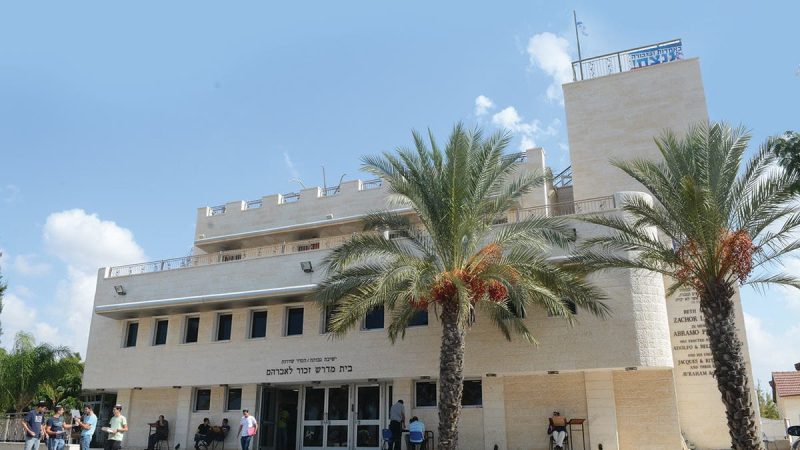A rabbinical seminary in southern Israel is open for business once again.
Prior to the Hamas attacks of Oct. 7, the Max and Ruth Schwartz Hesder Yeshiva in Sderot was a home to roughly 300 college-age men, and a smaller female class, who were pursuing religious instruction. While there are many such schools throughout Israel, this school is a particular kind as it not only provides traditional Jewish learning, but time to fulfill one’s commitments to Israel’s military.
The yeshiva’s halls and dorms alike have been empty. It’s mirrored the emptiness of Sderot ever since the day of the attacks.
‘I got to walk around a little bit more last week,’ says Rabbi Ari Katz, the school’s public relations director, when speaking to the ‘FOX News Rundown – Evening Edition’ podcast. ‘[It] used to be a city, which is a vibrant city that’s alive with 35 to 36,000 people.’
The city is still quite vacant. A few grocery stores have reopened. But the bustle is missing, except for now the yeshiva students who are coming back to their studies. For the past two months, another school in another town hosted them. But now they’re returning, and the yeshiva hopes it might encourage the city’s other residents to return.
‘Maybe that when they see that the yeshiva’s here, over 300 boys are here back now in the middle of the city, maybe that will have some type of ripple effect.’
Sderot’s western limits are just a couple of thousand feet from the northeast corner of the Gaza Strip. Beyond that border, it’s just a few miles to the now-infamous Jablalia where the IDF had been engaged in some of the bloodiest fighting of the now months-long war. While not as hard-struck as the kibbutz farms and the Nova music festival, Hamas terrorists were roaming Sderot’s boulevards looking for targets.
‘One basic difference between the war now, and all the previous rounds of fighting the last 22 years or so, is that the city of Sderot, in a way, got used to living under rocket fire,’ says Katz. ‘It’s very sad to say this, but they got used to the rocket fire. And what changed on Oct. 7 was the fact that in addition to the rocket fire, you had tens of terrorists that came into the city.’
That day was a Saturday, the Jewish sabbath, or Shabbat. It’s a weekly day for prayer and unwinding. It also coincided with another Jewish holy day called Simchat Torah, in which the cyclical reading of the Torah is concluded and restarted. The holy day brought a number of alumni to the campus that weekend – former students on active duty with the IDF, who happened to bring their weapons. Little did they know they would need them. Alumni and current students walked out from the safety of the yeshiva’s walls to confront enemies.
‘They just took their guns if they had a gun,’ marvels Katz. ‘If they didn’t even have guns, they just went down. They knew there was trouble. They went down.’
Katz can’t imagine how differently that day might have ended for them had the soldiers and students not been ready.
‘Because having those guns at least caused us to know if, God forbid, they would have [confronted] a terrorist, we had firepower to at least give them a fight. We even had some of the rabbis and students who joined the fighting in the city. One of our rabbis is a medic. He went to join the fighting and to take care of the wounded and he got hurt badly. Thank God he’s doing OK. So, in a way, that was very important to have the soldiers here.’
But bravery doesn’t come without fear, as well. And there were students who felt afraid. Katz and the other staff would later find a message written on a wall inside a dorm room. The message would send shivers down any spine.
‘It basically said, ‘We don’t know if we’re going to survive. We love you all. And we hope that you win.’ It was like a farewell message because they really didn’t know it was going to happen.’
Katz says the rest of Sderot’s residents may not come back as quickly. There is a fear of living close to Gaza, even though the IDF has mostly taken control of it for now. But he sees the yeshiva as playing a key role in bringing life in the city back to normal, even if normal is something new.
‘The yeshiva has been around for 28 years, so we’ve always been here for the people of the community, good times and bad times. Now we see our role, that we’re going to have to help. And we want to help the people when they come back. The rebuilding process, physical rebuilding, the government helps, and the city will help. I’m talking about the spiritual, emotional rebuilding. The yeshiva sees itself as having a very vital part in this whole process.’






























